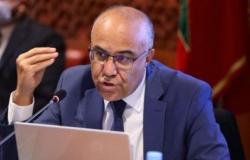This is the last test of the 2024 baccalaureate for high school students before going on vacation: the grand oral. Seven candidates have agreed to share one of the two subjects they have been working on in recent months.
Around the table, discussions are going well. They come back to the proposed topics, the plans developed and the ideas that we might have forgotten to mention in our copy…
Those who have experienced it know: the baccalaureate exam is one of the most significant periods in life. Narjesse, Antoine, Baptiste, Arsène, Noah, Ivan and Eliot are all in their final year at Jean-Vigo high school. In a few days, they all hope to join the circle of baccalaureate graduates.
This Friday, June 21, in the morning, the written tests are behind them. Everyone is now looking towards the grand oral, scheduled between June 24 and July 3, depending on the convocation day.
Presentation and questions
Introduced during the baccalaureate reform, the test counts for 10% of the total exam mark for candidates in the general stream and for 14% for those in the technological stream. During the year, high school students define two questions related to their specialty courses and prepare a reasoned response to them.
“On the day of the oral, one of the two questions is drawn, we then have a preparation time then ten minutes of presentation followed by ten minutes of questions and discussions”, explains Narjesse. A test whose objective is in particular to train young high school students to speak in public, the grand oral is for them an opportunity to explore a theme in more depth. “I really enjoyed preparing for this oral because I chose a theme that I like”continues the high school student.
Like her, her classmates all carried out research, sometimes for several months, to answer their problem and develop a structured response. “It’s always interesting to get out of the classic framework, I carried out my research based on my knowledge then by looking for documents, by reading articles”agrees Baptiste.
Various subjects
To carry out this work, high school students can count on their teachers. A history-geography and geopolitical teacher, Jean-Yves Bou has spent the whole year talking with the students, especially in developing their issues.
In recent years, he has organized a major public oral presentation with the Cultural Association of South Aveyron (ACSA). A meeting where volunteer high school students presented their work to spectators, enhanced with visual support.
“The schedule didn’t make it possible this year, but it was a great practice for the students in their public speaking skills.”, assures the professor. This year, it was around a table and in front of a small but attentive audience that the high school students presented a preview of the main points of one of the subjects they had prepared.
Various topics to discover in the boxes below. For high school students, once the oral exam has been passed, the next meeting is set for Monday July 8, for the publication of the baccalaureate results.
Discover the subjects of the different candidates
Narjesse:
My problematic is : “How does the Japanese occupation fit into the collective memory of South Korea?.
In my response, I recall that Japanese colonization lasted 35 years and I discuss its different aspects. In particular the “comfort women”, who were in fact sex slaves for the Japanese army, and how speech is freed today in a very modest society.
The question of memory is very important in my answer, how recognitions of guilt take place, through what themes, like art… I chose this subject because I am very interested in Korea.
The research I did was difficult, I consulted archives, borrowed books, but it was fascinating.
Antoine :
I became interested in the issues surrounding French rearmament. I started with the vote last year on the military programming law.
My argument is structured in several points. First, explain what this law consists of, how the calculation of the money needed for this programming is developed. I then explain the geopolitical context in which this law intervenes, with an explosion of conflicts in the world. I take the opportunity to make comparisons with other countries.
Finally, I address French military power and the recovery it wishes to make, both in terms of personnel and equipment, which is reflected in this additional budget allocation compared to other years.
Baptiste :
I decided to deal with terrorism, a subject that has always interested me, especially the treatment that can be given to it.
My problem therefore compares, in cases of terrorism in France, the new actors in the war which are the terrorist organizations Al-Qaeda and Daesh.
I worked on the similarities and differences between the two structures based on two terrorist cases: that of Mohammed Merah in 2012 and the attacks of November 13, 2015.
To do this, I describe each of the cases by detailing the claims, I am also interested in the similarities of the movements, their location but also in the differences in ideologies, their financing.
Arsene:
“How can chess be an instrument for people and powers?”this is the theme I worked on.
First of all, I am interested in the political aspect of the game of chess and its presence in heritage, such as its inscription on UNESCO.
I also address the question of its evolution as a sport and the origins of these games, claimed in particular by China, India and Iran. I then address chess during wars, including the Cold War period or as a tool for social cohesion under the USSR. Chess also has a strong social and economic role, it is part of a cultural heritage and has evolved significantly.
As a player myself, I enjoyed dealing with this theme.
Although:
For my part, I was interested in the heritage and memorial issues presented by Shuri Castle in Okinawa, Japan. I have been interested in Japan since middle school and plan to study history.
I came across the history of this castle while doing research. Almost completely destroyed and then rebuilt, it bears witness to an intangible and tangible heritage that needs to be protected. It is a plural memorial site, linked to the history of Japan.
After recalling its history and the issues, I discuss its role as an element of Japanese soft power, as with a G7 meeting which took place there. I also talk about the diplomatic issues linked to this place.
Ivan :
My topic is about food and how it is an instrument of commercial, economic and political domination.
This is a theme that I encountered while preparing for the Sciences-Po competition and which seemed important to me. I first address how in trade, food products define the order of power of countries.
In economics, food can become a food weapon, with control over the population as we saw in Mexico with the “tortilla crisis”. Finally, the political issue is also very present, we can observe it in certain conflicts.
Even if the state manages food policy, there is a fear of a transition from public to private where the interest of the common good could be threatened.
Eliot :
My subject concerns the testimony of a survivor of the Tutsi genocide in Rwanda.
In her memoirs, she says she never wanted to give her testimony, until the broadcast of archive images on the BBC in which she appeared. She then wanted to tell her story. The book takes place in two stages, the during and the after.
In dealing with this subject, I talk about the difficulty she encountered in understanding who she was, the process of memory she had to carry out. Thirty years later, she recounts what she experienced.
This topic was also an opportunity to address the mechanisms of genocide.






